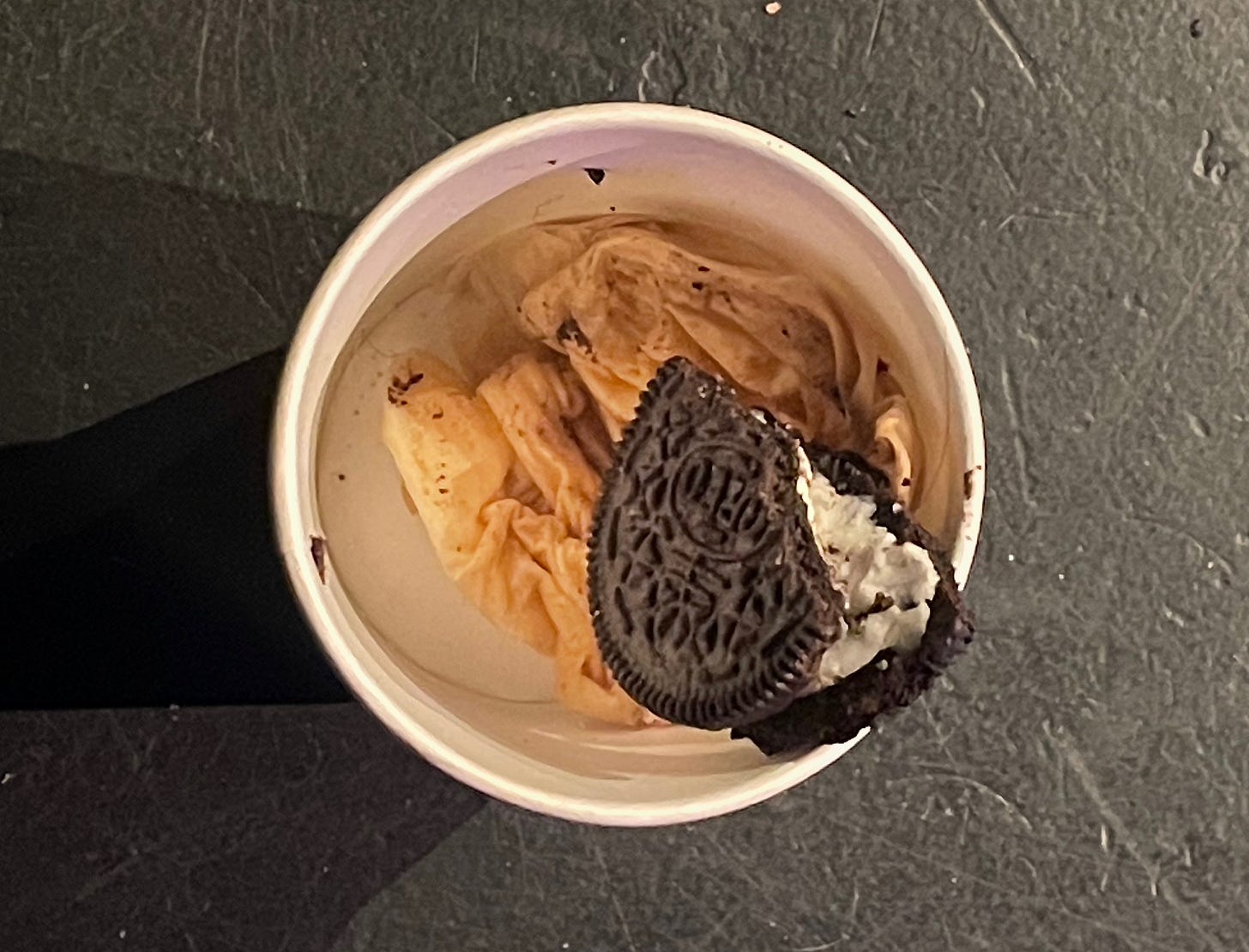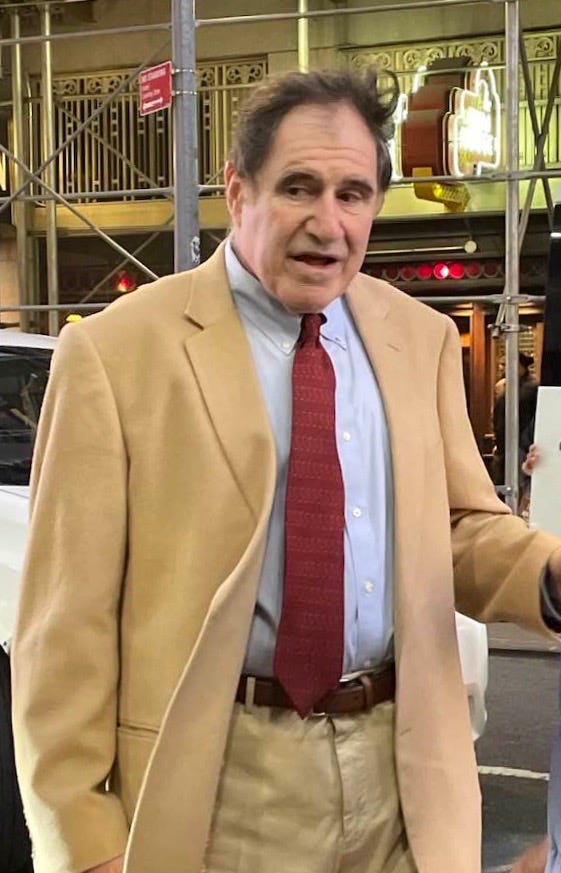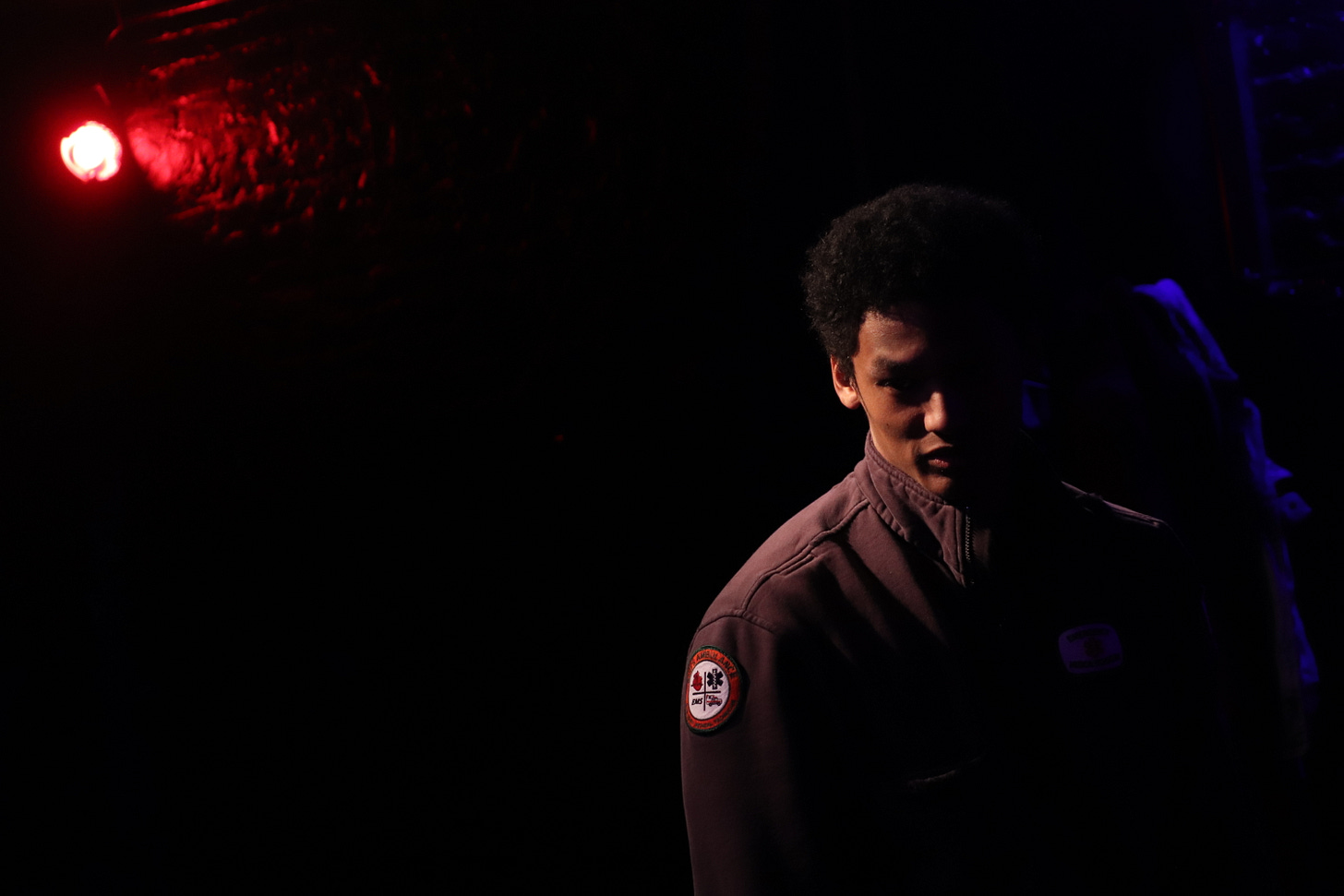The cookie in question taunts me at Anonymous (photo by twi-ny/mdr)
As I’ve written before, I am an immersive theater junkie. While several of my colleagues head for the hills when they hear that phrase, the words “immersive theater” get my juices flowing.
Not necessarily “participatory theater,” mind you; I definitely do not have an actor inside me waiting to burst out.
So I was excited at the prospect of seeing spit&vigor’s Anonymous at its tiny black box space above the Players Theatre on Macdougal Street in the West Village, having seen such previous s&v productions as The Wake of Dorcas Kelly, Ectoplasm, and Luna Eclipse. Taking place at an addiction support group meeting, the show promised: “The audience sits in [a] circle with the actors and experiences firsthand what the characters are going through.”
Count me in.
When I arrived at the twenty-six-by-nineteen-foot room, I had my pick of thirteen red-cushioned chairs. Between every two or three seats was a folding chair against a wall, where members of the cast would sit. In one corner was a table with coffee, tea, water, Oreos, and Fig Newtons for everyone, next to two posters, one that proclaimed, “Determination,” the other “Hang in there!” with a photo of a dangling cat. I poured a small cup of water and took a Fig Newton for later.
A printed bulletin welcomed us to the FA Community Center and pointed out that there is no smoking; the baby Jesus is still missing from last year’s nativity scene; there’s a bee problem in the kitchen; and whoever has been feeding the squirrel in the air vent needs to stop because the crafty rodent is “becoming territorial and terrorizing the Monday morning knitting circle.”
George Walsh portrays a man named Richard Kind in Anonymous (photo by Giancarlo Osaben)
Then spit&vigor executive producer Nick Thomas, who wrote and directed Anonymous, gave a brief introduction, explaining that the story is set in 1992, before cellphones were available (so turn yours off), and that this was not immersive theater but “embedded theater”; while it might sometimes appear that an actor is speaking directly to you, they’re not, and you shouldn’t respond, at least not vocally.
I’ve seen a slew of shows recently built around support groups, for alcoholism, drug addiction, grief, trauma, fear of death, and other issues. I had a feeling I was in for something special and personally involving when the first character (George Walsh) entered the room and started talking to himself.
“You got this, Rich. You can do this. Take a breath. It’s gonna be great. OK,” he said, clearly unsettled. “Ohh my goodness, why am I so nervous? I’ve been coming to this group for five years, and I’ve seen Charlie lead it for the last two. I can do this. I can lead this tonight. You’re not anonymous, you‘re Richard Kind, and you got this. You can do it. OK!”
Did he say his name was Richard Kind?! As mad transit readers know, I’ve been documenting my ever-increasing run-ins with the actual Richard Kind, the beloved Tony-nominated character actor who has appeared in such TV shows as Curb Your Enthusiasm, Only Murders in the Building, and Mad About You, such Broadway shows as The Tale of the Allergist’s Wife, The Producers, and The Big Knife, and such films as The Station Agent, Argo, and Beau Is Afraid. In Woody Allen’s 2020 comedy Rifkin’s Festival, Kind played Max Rifkin, which was the name of my paternal grandfather, who died while I was in utero.
Richard Kind and I have to stop meeting like this (photo by twi-ny/mdr)
I’ve bumped into Richard Kind more than half a dozen times over the last year or so, at the theater, on the street, and on the bus. We have a mutual friend, so I always mention that to him, but he must be getting freaked out about seeing me so often. At one show, I was sitting on the aisle in the section left of center, and he was in the same aisle seat in the section right of center. We smiled at each other and shrugged our shoulders in unison.
Maybe it’s all being orchestrated by Grandpa Max.
At first I thought that maybe Walsh was playing the real Richard, as he had some of the same gentle mannerisms and general look, but I eventually realized it’s not Kind. Of course, he sat down in the chair next to mine.
Back in the fictional world of the play, Charlie (Jesse Metz), who has been leading the group for several years, is unable to make it to the meeting and has asked Richard to take over on this cold night, which worries Richard and the others. They enter one by one, each concerned that Charlie is not there.
Sarah (company cofounding artistic director Sara Fellini, who also designed the realistic set) is an aspiring actress working as a bartender at a nightclub. Michael (cofounding executive director Adam Belvo, who alternates the role with Thomas) is a snarky, sharp-dressed finance dude who carries a briefcase and handheld phone, always doing business. Elizabeth (Phoebe Mar Halkowich) is a fun-loving socialite with a place in the Hamptons. Diana (Azumi Tsutsui) is a mystery woman who hasn’t spoken to or even acknowledged anyone since she started coming to the meetings. And Blake (Aaron Dorelien) is a young ambulance driver who Sarah and Elizabeth have the hots for.
“The things I would do to him, and more importantly let him do to me,” Sarah says dreamily. Elizabeth adds, “He is delicious!”
Despite the rule against smoking, most of the attendees pull out cigarettes, using black ashtrays at their feet, next to their coffee or tea. (They only pretend to smoke.)
Elizabeth is sitting to my left, her chair extremely close to mine, so much so that at one point the strap from her bag was on my knee. Because of my love of immersive theater, I found that charming rather than invasive.
Then it happened.
Elizabeth will soon be searching for her cookie in Anonymous (photo by Giancarlo Osaben)
Elizabeth got up to get something from the table, and while she was there, I accidentally kicked over her coffee cup, spilling java on the floor. Fortunately, the cup wasn’t full, but it did form a little puddle. I got a napkin out of my pocket and tried to mop it up without anyone realizing what I’d done; I was terrified that it would attract attention and negatively impact the flow of the play.
No one seemed to notice, as the action was occurring at the table, twenty or so feet away.
In my cleanup frenzy, I somehow got Elizabeth’s unfinished Oreo wet; I have no memory of how, but I had to scoop it up with the napkin and put it in my empty cup of water. I immediately recalled how she had been holding the cookie in her right hand and had taken a bite, since I could practically touch it myself, and I certainly could smell it.
I also remembered how Sarah had earlier announced, “Ohh yes, a cookie; sometimes I think the only reason I come to the group is for cookies. I don’t let myself have them in the house.” (I didn’t recall every single word, just the gist of it.) Elizabeth had concurred with Sarah.
When Elizabeth returned to her seat, I motioned at the spill and whispered a heartfelt apology (without mentioning the cookie); she sweetly brushed it off, letting me know it was fine. She then began looking around, under, and behind her chair. I had a fear that she was searching for the Oreo. She even scavenged through her purse; she pulled out a compact to check her makeup but I was still convinced she needed the cookie.
I rearranged the items in my cup so the piece of cookie was peeking out, in the hope she would see it, but that didn’t work. I put my Fig Newton on a napkin on the floor, thinking that if she needed a cookie prop, she could use that.
The play continued, a thoughtful and engrossing study of addiction, group therapy, and personal responsibility, offering fresh insight into what has become a conventional, overly familiar theatrical trope in recent years.
And then my insides turned upside down when Blake, after an angry speech, said with increasing volume, “Where are the chocolate creams? I don’t see any chocolate creams. Where are the FUCKING chocolate creams.”
I had screwed up big time. Blake wasn’t yelling at me, but he might as well have been.
He went on, “Where are the goddamn fucking chocolate cream cookies! I just want a fucking chocolate cookie. Don’t I deserve one?”
Blake (Aaron Dorelien) really wants a cookie in Anonymous (photo by Giancarlo Osaben)
I was reaching panic mode.
“I see that Michael has a chocolate cream! And Elizabeth had one!”
I eased up for a second. I thought to myself, he said “had,” not “has,” past tense, right?
The second half of the seventy-five-minute play was tense and riveting, leading to an exciting finale that you won’t see coming and that will keep you on the edge of your seat.
Overall, the writing, directing, and acting are exemplary, making for a terrific immersive — er, embedded — theatrical experience.
After the show, the audience was invited to chat with the cast and crew. I immediately went over to George to share a bit of my Richard Kind story. I then made my way to Phoebe and admitted my fears about the cookie.
She told me not to worry about it, that Dorelien had noticed there was no cookie and had improvised. “We’re actors; that’s what we do,” she reassured me.
When I got home, I scanned through the script and there it was: Blake was supposed to say, “And Elizabeth has one!”
Present tense.
On my way home, I was hungry for a chocolate cookie.
[Anonymous continues Thursdays, Fridays, and Saturdays through February 22; tickets are $30–$60. You can follow Mark Rifkin and This Week in New York every day here.]








Just reading this piece made me anxious!